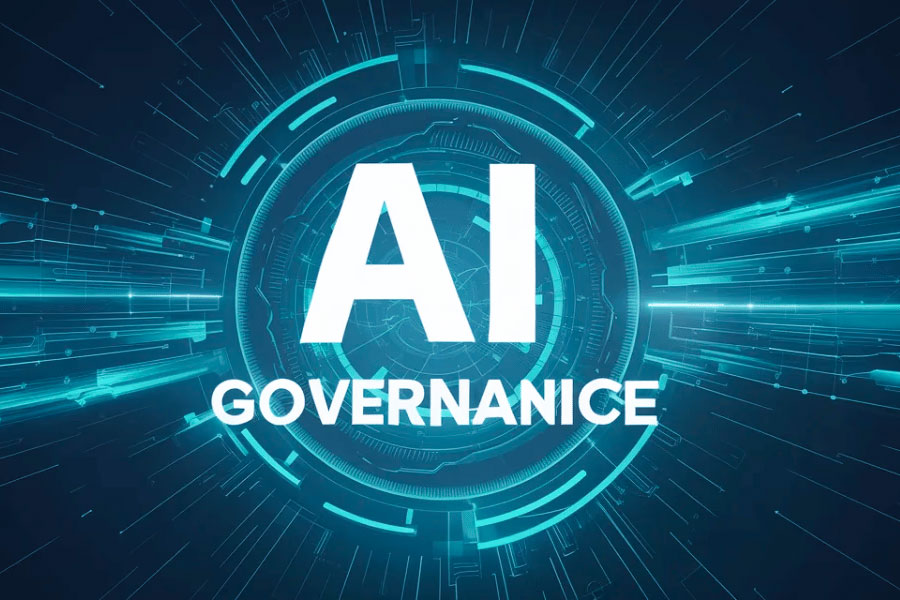The Role of AI Governance in Healthcare
AI Governance in Healthcare
Artificial Intelligence (AI) is transforming healthcare, from predictive analytics and medical imaging to personalized treatment plans and administrative automation. However, AI governance is essential to ensure ethical use, compliance, patient safety, data privacy, and transparency in AI-driven healthcare systems.
- Why AI Governance is Critical in Healthcare
- Regulatory Compliance & Ethical Standards
Healthcare AI must comply with strict regulations to protect patient data and ensure fairness.
- Regulatory Frameworks:
- HIPAA (Health Insurance Portability and Accountability Act) – Ensures patient data privacy and security.
- GDPR (General Data Protection Regulation, EU) – Governs patient data protection and consent.
- FDA & CE Marking (U.S. & EU) – Regulate AI-based medical devices and software.
- Ethical AI Guidelines (WHO, OECD, IEEE, EU AI Act) – Promote fairness, transparency, and accountability in AI-driven healthcare solutions.
🔹 Impact:
AI governance ensures regulatory compliance, ethical AI deployment, and responsible patient data handling to avoid legal and reputational risks.
- Patient Safety & Bias Mitigation
AI algorithms must be accurate, unbiased, and reliable to ensure patient safety and equitable healthcare outcomes.
- Challenges:
- Algorithmic Bias – AI models trained on non-representative datasets may lead to misdiagnosis in underrepresented groups (e.g., racial, gender, socioeconomic biases).
- Clinical Validation – AI must undergo rigorous testing before being used in diagnosis, treatment recommendations, and drug discovery.
🔹 Impact:
AI governance establishes fairness audits, bias monitoring, and human oversight frameworks to ensure that AI-driven decisions are equitable and clinically validated.
- Data Privacy & Security in AI Models
AI systems rely on vast amounts of patient data, making data privacy and security crucial in healthcare governance.
- Risks:
- AI-powered cyberattacks – Hackers can exploit AI models to breach patient data.
- Informed Consent Issues – Patients may not fully understand how their data is used in AI algorithms.
- Data Anonymization & Sharing – Ensuring compliance with HIPAA, GDPR, and de-identification standards.
🔹 Impact:
AI governance enforces data encryption, anonymization, access controls, and cybersecurity measures to protect patient confidentiality and prevent breaches.
- Explainability & Transparency of AI Decisions
AI models must be interpretable so healthcare professionals and patients can trust AI-generated recommendations.
- Challenges:
- Black-Box AI Systems – Complex deep learning models lack transparency.
- Legal & Ethical Accountability – Unclear AI decision-making processes could lead to medical malpractice risks.
- Clinician & Patient Trust Issues – Lack of explainability may result in reluctance to adopt AI solutions.
🔹 Impact:
AI governance frameworks encourage:
✅ Explainable AI (XAI) – Using interpretable models and AI dashboards for physicians to understand predictions.
✅ Human-in-the-Loop (HITL) – Requiring human validation for critical AI-generated decisions.
✅ Auditable AI Logs – Tracking AI decisions for legal accountability and quality control.
- AI Integration into Healthcare Workflows
AI solutions must be integrated into clinical workflows, EHR systems, and hospital operations seamlessly.
- Challenges:
- Interoperability Issues – AI tools must work with existing electronic health record (EHR) systems (e.g., Epic, Cerner).
- Physician Workload Balance – AI should assist rather than overburden healthcare professionals.
- AI Training for Clinicians – Ensuring doctors understand and use AI responsibly.
🔹 Impact:
AI governance establishes standards for AI-EHR integration, physician training programs, and AI usability testing to optimize clinical adoption and efficiency.
- Key AI Governance Strategies in Healthcare
🔸 Regulatory Compliance Frameworks
- Implement AI regulatory audits to ensure compliance with HIPAA, GDPR, FDA, and other standards.
- Maintain AI ethics committees to oversee patient safety and algorithm fairness.
🔸 Bias Detection & Fairness Audits
- Use diverse training datasets to reduce bias in AI models.
- Conduct regular fairness audits to identify and mitigate biases.
🔸 Explainability & Trust-Building Measures
- Adopt Explainable AI (XAI) techniques for transparency.
- Develop AI reporting mechanisms to justify AI-generated medical decisions.
🔸 Data Privacy & Cybersecurity Controls
- Encrypt and de-identify patient data before AI processing.
- Implement zero-trust security models for AI-driven health applications.
🔸 Human Oversight & AI Integration
- Require clinician validation of AI-generated diagnoses and treatment plans.
- Train healthcare professionals in AI ethics, interpretation, and responsible use.
- The Future of AI Governance in Healthcare
AI-Driven Personalized Medicine: Governing AI algorithms for genomics-based treatment plans.
AI-Powered Drug Discovery: Ensuring responsible governance in AI-assisted pharmaceutical research.
Stronger AI Cybersecurity: Enforcing stricter AI risk management frameworks to prevent cyber threats.
AI-Augmented Diagnostics: Governing AI’s role in radiology, pathology, and clinical decision support.
Conclusion
AI governance in healthcare is essential for ensuring compliance, patient safety, ethical AI use, data privacy, and transparency. As AI continues to revolutionize diagnostics, treatment, and hospital management, robust governance frameworks will be crucial in building trust, minimizing risks, and ensuring AI enhances—not replaces—human expertise.
recent posts
You may already have a formal Data Governance program in [...]

